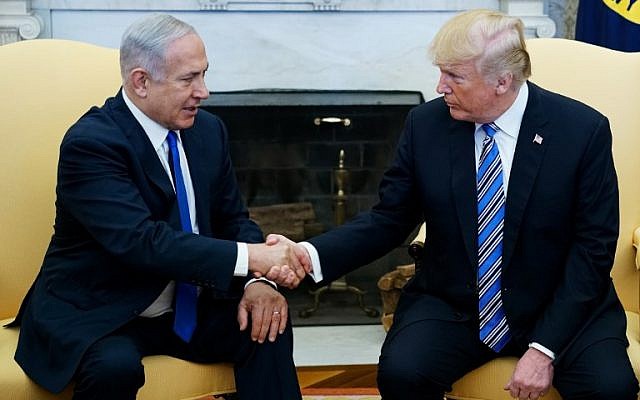And if you do go ahead, at least don’t let Riyadh enrich its own uranium, PM reportedly urged US president; Saudis want up to 17 reactors, Iran-style enrichment rights
During talks in Washington this week, Prime Minister Benjamin Netanyahu asked US President Donald Trump not to go ahead with an emerging deal to sell Saudi Arabia nuclear reactors, Channel 10 news reported Friday.
Trump reportedly refused to commit to halting the plan, telling Netanyahu that if the US did not supply the reactors, then the Russians or Chinese would, the report said, citing unnamed senior Israeli officials.
In recent months Saudi Arabia has announced its intentions of embarking on a massive program to become “self-sufficient” in producing nuclear fuel. Preliminary plans suggest the Saudis may be looking to build as many as 17 reactors in all.
Netanyahu’s requests come despite an apparent ongoing improvement in behind-the-scene ties between Jerusalem and Riyadh, ironically spurred by a joint desire to prevent Iran from acquiring nuclear weapons and to fix the Iran nuclear deal. This week, the Saudis granted Air India permission to fly through Saudi airspace to Israel, a first in 70 years.
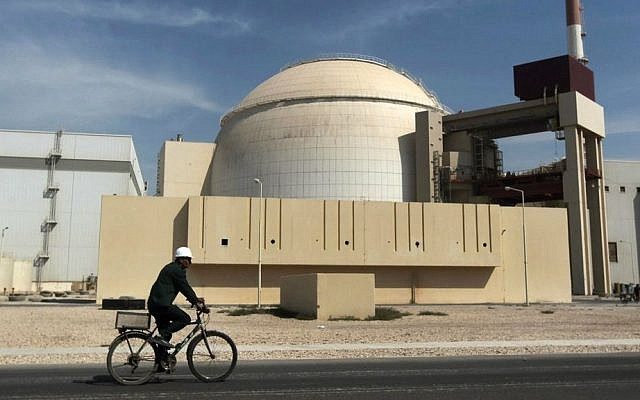
A worker rides a bicycle in front of the reactor building of the Bushehr nuclear power plant, just outside the southern city of Bushehr, Iran, on October 26, 2010. (AP/Mehr News Agency, Majid Asgaripour, File)
During talks at the White House on Monday, Netanyahu and his team reportedly asked that, if the Americans insist on going ahead with building the reactors, Saudi Arabia be prevented from enriching uranium by itself, Channel 10 said. They demanded that this be a precondition for the entire deal.
The Saudis meanwhile, are reportedly demanding the right to enrich uranium and have made it a condition to awarding the contracts — expected to be worth tens of billions of dollars — to US companies.
Trump did not give Netanyahu a final answer, but the two sides agreed that senior officials would continue to discuss the issue, the report said.
Netanyahu’s office told Channel 10 in response that it does not comment on the content of closed-door talks.
However, it noted that the prime minister has repeatedly warned of the many dangers of the Iran nuclear deal, including demands from other countries in the region to have the same rights as Iran was granted, including enriching uranium. The only way to prevent this is to fix the shortcomings of the deal or to cancel it, his office said.
The White House had no comment.
During a visit to the UN in New York on Thursday, Netanyahu apparently referred to his White House conversations on the nuclear issue. Netanyahu said he was asked in Washington about his position on other Middle East countries seeking to enrich uranium, and that he responded by asking why they would want to do that.
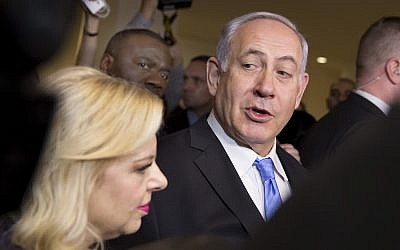
Israel’s Prime Minister Benjamin Netanyahu, accompanied by his wife Sara Netanyahu, responds to media questions after he visited the ‘3000 years of history: Jews in Jerusalem’ exhibit at United Nations headquarters, Thursday, March 8, 2018. (AP Photo/Richard Drew)
US officials, he said, told him “the reason that they’re asking to enrich uranium is because Iran has received the right to enrich uranium under the dubious nuclear agreement.”
“The best way to prevent the nuclearization of the Middle East is to either fully fix the Iran deal, or fully nix it,” he then said. “This is the only way to prevent the inevitable spread of nuclear technology and nuclear weapons in the Middle East.”
Throughout his trip, Netanyahu repeatedly said he supports Trump’s ultimatum to the US Congress that it either modify the nuclear deal — by ending its sunset provisions, incorporating a ban on ballistic missile tests and granting greater access to Iran’s military sites — or he will abrogate it. The American legislature is now on a deadline of less than two months to reach an agreement.
In December, Saudi Arabia’s energy minister said the US and Riyadh will begin talks within weeks on cooperation over the kingdom’s emergent civilian nuclear program.
Khalid al-Falih told Reuters his nation would ask Washington to allow US companies to take part in the program.
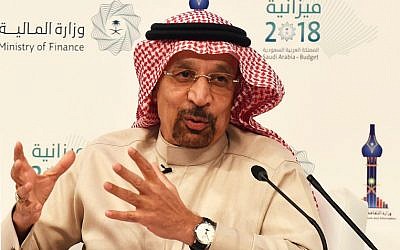
Saudi Arabia’s Minister of Energy, Industry and Mineral Resources, Khalid Al-Falih speaks during a press conference in Riyadh, on December 20, 2017. (AFP/Fayez Nureldine)
Falih noted that Saudi Arabia has already “signed agreements with China, Russia, with France, so their technologies will be competing for the Saudi national nuclear project.”
US law forbids cooperation with nations that have not signed a so-called Section 123 Agreement, which limits nuclear work to peaceful uses only. Though Riyadh has said it does not seek a military program, it has said it seeks “self-sufficiency in producing nuclear fuel” and has in the past refused to sign an agreement that would limit its ability to enrich uranium.
“We hope that through the negotiations that will be taking place over the next few weeks with our American partners that we will find common ground that will allow the American government to meet the intent of American law,” Falih said.
“We absolutely want to harness nuclear energy for peaceful purposes. There should be no doubt about Saudi Arabian intentions. Whatever we do is going to be under strict compliance with international agreements,” he said.
“But we will not deprive ourselves of accessing our natural resources and localizing an industry that we intend to be with us for the long term.”
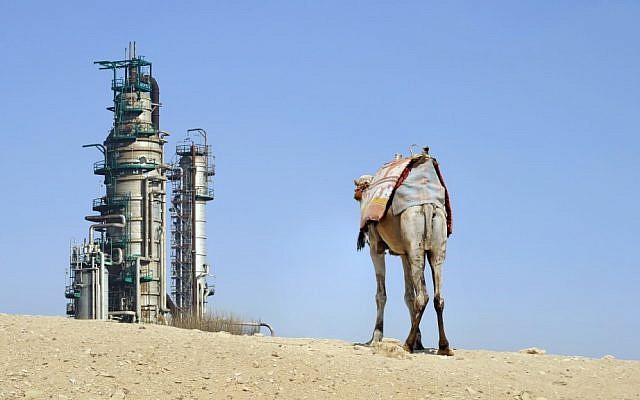
Illustrative photo of a Saudi Arabian oil facility. (Shutterstock images)
